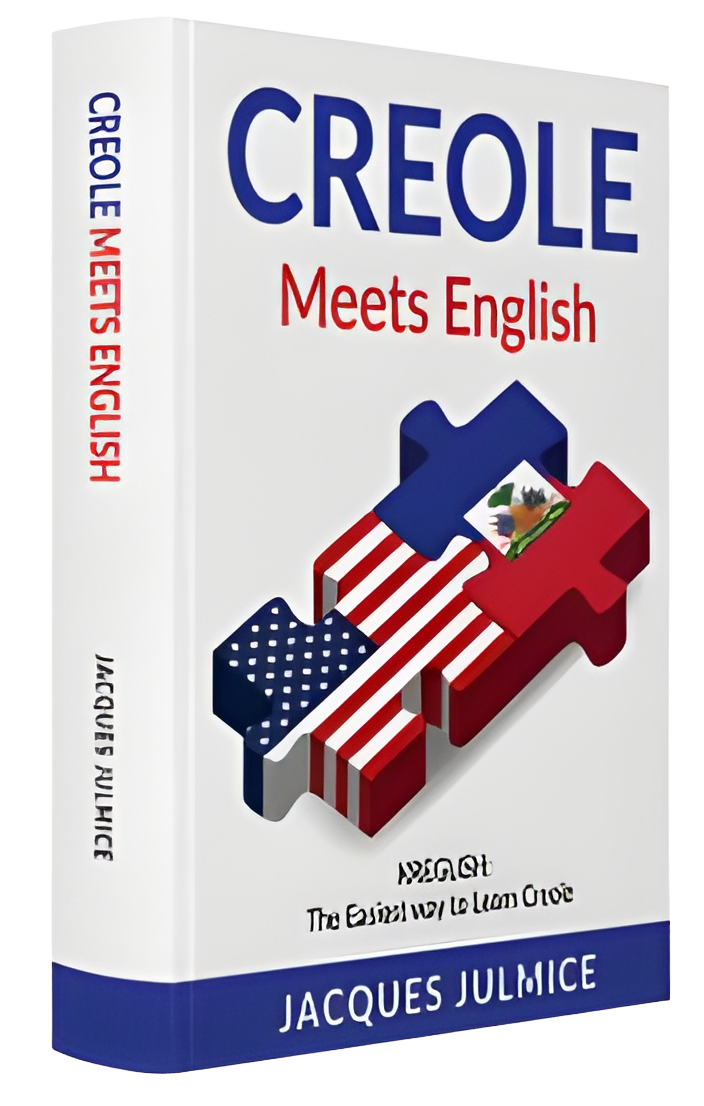FAQ
The primary purpose of Creole Meets English is to provide English speakers a quicker, more efficient way than the traditional methods to speak, read, and write Haitian Creole. Native Haitian Creole speakers may also find this resource helpful to learn English and improve their vocabulary and conversational skills.
Creole is the French and English spelling of the name of the language; however, in the native tongue itself, it’s spelled Kreyòl.
Officially Haiti has two official languages French and Creole. However only a small percentage of the population can communicate in both languages. 90% speak Kreyòl only and can’t communicate in French.
French-based Creole languages are spoken in four principal areas in addition to Haiti:
- The Lesser Antilles namely Dominica, Guadeloupe, Martinique, Saint-Barth, and Saint-Lucia,
- French Guyana,
- Louisiana, and
- The Mascarene Archipelago: Reunion, Mauritius, and the Seychelles of the Indian Ocean.
Although there are some similarities, they’re very significant in terms of vocabulary, grammar, and pronunciation. The Creole languages of the Atlantic Ocean are significantly different from those of the Indian Ocean. However the Creole spoken in Haiti is much closer to those in the Lesser Antilles.
The primary Creole language of Creole Meets English is the one that’s spoken in Haiti. However due to the similarities between Haitian Creole and the Creole language spoken in the Lesser Antilles, learning Haitian Creole will make it easier to pick up any of the other ones.
Kreglish is a method that’s introduced for the first time in Creole Meets English that takes advantage of some newly discovered similarities between English and Creole. In the past we talked about similarities between the two languages based on some words borrowed from English during the American occupation from 1915 to 1934. For example the word ‘bokit’ is derived from bucket. The Kreglish similarities are different in that the focus is on the English phonetic. For example ‘foul moun’ has nothing to do with English whatsoever except for the fact that it sounds exactly like ‘full moon’. Its meaning is a crowd of people. There are thousands of examples like this; they help with pronunciation that’s typically the most difficult aspect of learning a new language. No one knew about these similarities until Kreglish came along. Kreglish is quicker and more efficient than the traditional methods.
In addition to the new similarities that help with pronunciation, there are three other aspects of Kreglish that are crucial.
- I’m not a big fan of memorizing vocabulary words, I encourage aspiring speakers to take full advantage of the cognates, which are words that are familiar.
- I started using mnemonic over 30 years ago; it played a major role in helping me learn the 3 languages that I know in addition to Creole. In the book, I shared my experience with mnemonics and show the readers how take also take advantage of it.
- Creole is super easy to read; one only needs to know a handful of sounds made primarily by the vowels and a few blends to be able to read Creole. Therefore we teach aspiring learners to read Creole right at the beginning of their journey. Once you’re able to read it, speaking it becomes much easier.
- Better pronunciation
- Earlier mastery of pronunciation
- More practical
- Better retention
- Help build confidence
- More appropriate for the times we live in where many learning processes are changing
- More motivation for the reader
- Anyone can learn Creole from this book without using any other resources
- Appropriate for learners of all levels
- Native Creole speakers will also benefit greatly from this book
- In terms of Grammar, Creole Meets English covers the following:
- Nouns
- Gender or lack thereof
- Definite articles
- Indefinite articles
- Subjects
- Verbs
- Pronouns
- Possession
- adjectives
- Adverbs
- Singular and plural or lack thereof
- Conjugations
- Questions
- Greetings and salutations
- Conversations
Although Creole Meets English’s primary purpose is for English speakers to learn Creole, it’s also a great resource for Creole speakers who want to learn English. We emphasize on similarities that are useful for both English and Creole speakers.
My initial motivation for writing a Creole book was to teach native Creole speakers how to properly spell and write Creole. That’s a very important goal of mine that turned into a passion. Although that was no longer the goal when I decided to write Creole Meets English, I judged that it was important to still share valuable instructions to help native Creole with the spelling aspect. In addition most native speakers never had the opportunity to think of Creole analytically. Creole will help you think of Creole as the other languages you’ve studied.
Creole Meets English is loaded with valuable information and covers a variety of topics. In addition to the book, I offer 1 on 1 or small group face to face classes if you’re local. Classes are also available over web conference. Contact me for a FREE no obligation initial consultation to discuss enrolling for classes.
Although it isn’t necessary to buy the book if you’re taking classes, it’s highly recommended. If you have other books you’ve acquired and you want to continue using them, I can certainly teach you using online materials and presentations that I’ve prepared for past webinars.
Many French speakers speak English or have studied English at school. If you know English, you certainly can take full advantage of Creole Meets English. If you don’t know English, reach out to me and we’ll find a solution for you.
Pidgin is a linguistic communication that comprised of components of two or more other languages and is used for communication among people. It isn’t a first language, whereas Creole is a language that was at first a pidgin but has evolved to become a first language. Unlike pidgins, creoles have fully developed vocabulary and grammar.
Email, call or text me; all means of communicating with me can be found on the website; or you can fill out the form found on the Contact Us page. Indicate what day and time work best for you. One of my staff will get back with you to finalize your class schedule.
In my opinion Creole is much closer to English than French. Because Creole is a French-based language, by default
Learning a second or foreign language helps you develop senses, confidence, and personal processes that make it easier for you to learn a third language. In addition there are so many similarities between Creole and French, that learning Creole will certainly makes it easier to pick up French.



